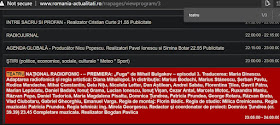 Recently, Duolingo presented me with a "year in review badge" and I remembered that not long ago I posted about it together with how to learn Romanian with eteatru. So the badge proves I’ve been keeping at learning new languages and keeping the ones I had already known “fresh” in my mind – apparently, I’m in the top 1% users of this free app.
Recently, Duolingo presented me with a "year in review badge" and I remembered that not long ago I posted about it together with how to learn Romanian with eteatru. So the badge proves I’ve been keeping at learning new languages and keeping the ones I had already known “fresh” in my mind – apparently, I’m in the top 1% users of this free app.
I haven’t been so keen on practicing Romanian, because it’s my native language. I do the same with my physical exercises program: I don’t exercise my legs so much because they’re quite muscular already, due to having been skiing and biking since I was little. The downside is that my Romanian vocabulary is shrinking and my brain is pushing Romanian words into archive, clearing the immediate buffer. And the way to counter that is to listen to Romanian theatre on the radio, which is what in English is called “radio drama”.
In keeping with my previous choice, I looked for pretty much the same artists and discovered the play “Three O’ Clock sau Duminică la ora trei de Ana-Maria Bamberger” – that’s right, it has a dual language title, it’s almost made to be featured here. Before listening to it, I’ve looked up the playwright and discovered, quite remarkably, that she’s also a physician at the University of Hamburg but based in Paris. Major diaspora creds!
I listened to only part of it and enjoyed the back and forth between Maia Morgenstern and Rodica Mandache, and started wondering what do all the directors listed there do? How to those titles translate in English? How is such a production made? Fact is, I've no idea how to assess or differentiate directors. As an actor, I haven't reached a level of my craft where I am able to distinguish between directors capabilities - I fear I don't even have the "unique accessibility to self" that James Lipton of Actors Studio interviews talked about on Lary King and Big Think.
As for acting, I have myself acted in a few theatre productions, which taught me to respect accomplished actors and better understand their creative effort and the amount of work, inspiration and transpiration that goes into a successful performance. I will forever remember how my ego was obliterated when I first saw a recording of my performance – it was so different from what I had thought I was doing, and mostly to the downside. So, in short, I have a lot of respect for actors who get into their roles smoothly and are in complete agreement with what the playwright is trying to convey. Needless to say, the two monstres sacres have raised the bar on what to expect from radio theatre and increased my anxiety on trying to act again.
I could’ve tried to listen to the play in its entirety, but that’ s not my style. I felt I have to get more theatre and found this:
Teatrul Naţional Radiofonic prezintă în premieră: ”Fuga” de Mihail Bulgakov.
Regia artistică: Diana Mihailopol.
Traducerea: Maria Dinescu
În perioada 14 - 17 decembrie, de la ora 23 și 5 minute, la Radio România Actualități!.

Bulgakov is famous for Master and Margarita and, like Ms Bamberger above, was both a playwright and a physician. If you didn’t know about this book, maybe you’re on the wrong blog – I recommend ZBiM. If you knew that but haven’t read it, you should: TED 4:32, pearl 11:33, JCCCvideo 47:02. Here’s its Gutenberg page, a PDF, Amazon, TPL, audio playlist, video playlist.
Remarkable about Bulgakov is not just his collaboration with Stanislavski (the method acting father) but also his surprising relationship with Stalin. Though repeatedly censored by the state apparatus, Stalin enjoyed his plays and held him in high regard. Here’s what Wikipedia tells us:
Between 1922 and 1926, Bulgakov wrote several plays (including Zoyka's Apartment), none of which were allowed production at the time. The Run, treating the horrors of a fratricidal war, was personally banned by Joseph Stalin after the Glavrepertkom (Department of Repertoire) decided that it "glorified emigration and White generals". In 1924, Bulgakov divorced his first wife and the next year married Lyubov Belozerskaya.
When one of Moscow's theatre directors severely criticised Bulgakov, Stalin personally protected him, saying that a writer of Bulgakov's quality was above "party words" like "left" and "right". Stalin found work for the playwright at a small Moscow theatre, and next the Moscow Art Theatre (MAT). On 5 October 1926, The Days of the Turbins, the play which continued the theme of The White Guard (the fate of Russian intellectuals and officers of the Tsarist Army caught up in revolution and Civil war) was premiered at the MAT. Stalin liked it very much and reportedly saw it at least 15 times.
*(*This article is unfinished – it was scheduled to appear in the hope that it will be finished before, but since this message is here and until it is removed, the article is to be considered work in progress*)*.
Sources / More info: tct-bulgakov10, yt-buanbio, chyk-ysl, loc-bulgakov, he-bulgakov, wbm-bru, tls-1967, jstor